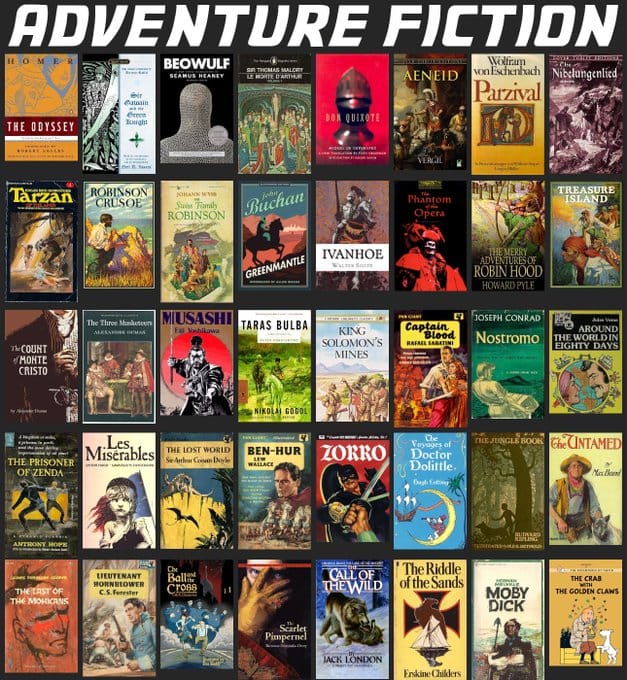Dorothy Sayers on Education
Dorothy Sayers wrote a brief essay on education in 1947, the Lost Tools of Learning. I have observed that her ideas are about as welcome as Charles Murray's, but for a different reason. In Real Education, Murray rightly criticizes the idea that schooling was better in America in the late XIXth century because of the astounding difficulty of the McGuffey readers, or high school entrance exams. Of course they were harder, most children did not enter high school. Only the gifted were educated, so the materials catered to a much higher level of intellectual ability. Sayers, however, is even more old-fashioned than that. Her essay compares the schooling of mid XXth century England to the Liberal Arts education of the Middle Ages, and finds the modern system lacking in several important respects.
Sayers was one of the Inklings, a friend of C. S. Lewis and J. R. R. Tolkien. Like the other Inklings, Sayers was formed in a robust Aristotelian tradition. As such, she knew of the system of education that reached its apogee in the High Middle Ages, and could discuss its relative merits and demerits.
The system was divided into two parts, the Trivium, and the Quadrivium, there being three subjects in the first and four in the second. The Trivium consists of Grammar, Dialectic, and Rhetoric, in that order. The first three subjects were mastered before the latter four were begun. The Quadrivium consists of Arithmetic, Geometry, Astronomy, and Music. These latter four subjects more or less were the equivalent of a college degree today, and were intended to be a foundation for any kind of intellectual work.
All together, this was a liberal education in the Middle Ages. It is interesting how the meaning of things changes over time. Today, the liberal arts typically do not include much in the way of math or natural science, whereas in the Middle Ages that was all they were. Music in this curriculum is mostly mathematical as well, thanks to Pythagoras. The education of university students was thus big on logic, public speaking, mathematics, and natural science. Part of the reason this changed was the Humanist movement in the Renaissance, which put a much greater emphasis on fine arts and literature as the mark of an educated man.
Sayers did not in fact propose to import the system as it was, but rather was more interested in the psychological underpinnings of the system. The first subject, grammar, was primarily the learning of Latin, but the intent of learning Latin was to give one the tools to express oneself. In modern times, this is what goes on in elementary school, also known as grammar school. The essential task here is simply memorization. You need to learn to add, and subtract, what a giraffe is, how to read and spell, and innumerable other facts. There is no other way to go about this than to simply memorize lots and lots of facts. However, this is what young children are exceedingly good at. This is one of the most striking parts of Sayers' argument, because she is arguing that we are wasting valuable mental resources by not taking advantage of this. This has probably become even worse since the 1940s, with teaching methodologies like constructivist math and whole language that attempt to make small children reason ab initio the basics of learning.
There is great bias against memorization in education. Memorization does take on lesser and lesser importance as one moves up to more challenging subjects, but it never really is unimportant. I can remember being told by one of my physics professors that I never needed to memorize an equation, because we could just look it up if we needed it. As far as it goes, this is correct. My guess is that this was a reaction to methods of evaluation that emphasized the ability to memorize formulas over the ability to make use of them, but the best way to make use of formulas is to know a great many by heart so that you can apply them as the need arises. It is greatly distracting to be continually consulting reference works, and I still rue this particular piece of advice.
There is at least one challenging subject that still relies upon memorization: medicine. A great deal of medical school is simply the memorization of facts. This is a staple of medical TV shows, the intending physician turns to the interns and demands to know what disease presents a given set of symptoms, and they all compete to be the first to recollect the answer. In really unusual cases, they will turn to books, but in routine cases, doctors do not have time to go look it up. You need to know, usually right now, whether those drugs do not play well together.
There are useful aspects of history, and geography, and even literature that can be memorized for later use. The long lists of battles or kings are exactly the kind of framework one can use to piece together unified historical understanding at a later date. Absent some markers, it can be hard to piece together otherwise disparate events, such as the European politics of the early XVIth century, and the nearly successful Turkish Siege of Vienna in 1529. Gee, who was the King of France in 1529? Francis I, who had been held for ransom by the Holy Roman Emperor Charles V in1525, and allied with the Turks against his coreligionists.
You can look this stuff up, but it slows the mind to always have to do so. Having the information ready to hand makes it easier to see the connections. But it is a lot harder to construct the necessary framework later. It can be done, for example, John Reilly uses the metahistorical structure of Oswald Spengler as a mental filing cabinet. However, that means a lot of work reading notoriously difficult tomes full of polysyllabic German constructions. If you like that kind of thing, go ahead, but why make it hard?
Having given students the raw material, the next stage of the Trivium focuses on logical argumentation. Sayers uses the term formal logic, but in this day that term has been usurped by Boolean algebra. Better to just call it Aristotelian logic. This older logic is better for the task at hand, because modern formal logic does not address the critical aspects of definition and judgment, and instead leaps ahead to argument. One needs to be able to understand what a thing is before you can begin to argue about it. Once that is done, learning to reason well requires the memorization (that word again!) of the kinds of syllogism. This seems rather pointless, but the idea is to be able to know reflexively whether a given argument is valid. If you have to think it over or look it up, it is too late. I know this by experience, I failed to memorize the figures of the syllogism for my graduate logic course, and barely passed with a C-. I am still annoyed at myself for this, because the mind moves much quicker when the logic is reflexive.
Sayers has much less to say about Rhetoric, since by its nature it has a wider scope than the other two parts of the Trivium. However, this is really the point at which the kind of self-expressive and self-reflective learning tools so common today become really appropriate. With the mental tools to do so, children ought to be able to pursue their interests more effectively. I can still remember being forced to journal as a kindergartener. I still have no idea what useful purpose that could have been intended to serve, but being forced to write "I went to the park. I like cows." instilled in me a hatred of that kind of work for many years afterward. I suspect that the whole educational apparatus in this day and age ties to make children reason far sooner than they are really able to.



Comments ()